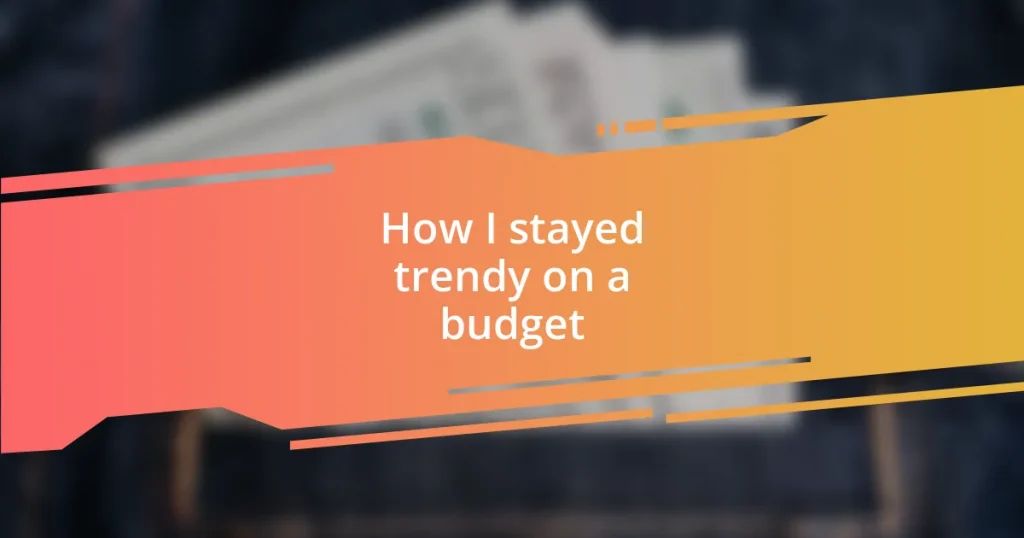Key takeaways:
- Jewelry appraisals blend art and science, valuing pieces by considering their materials, craftsmanship, and emotional significance.
- Choosing a qualified appraiser with appropriate credentials and experience is essential for an accurate and meaningful evaluation of your jewelry.
- Post-appraisal, it’s vital to ensure jewelry is properly insured, and an understanding of its value can deepen emotional connections to the pieces.
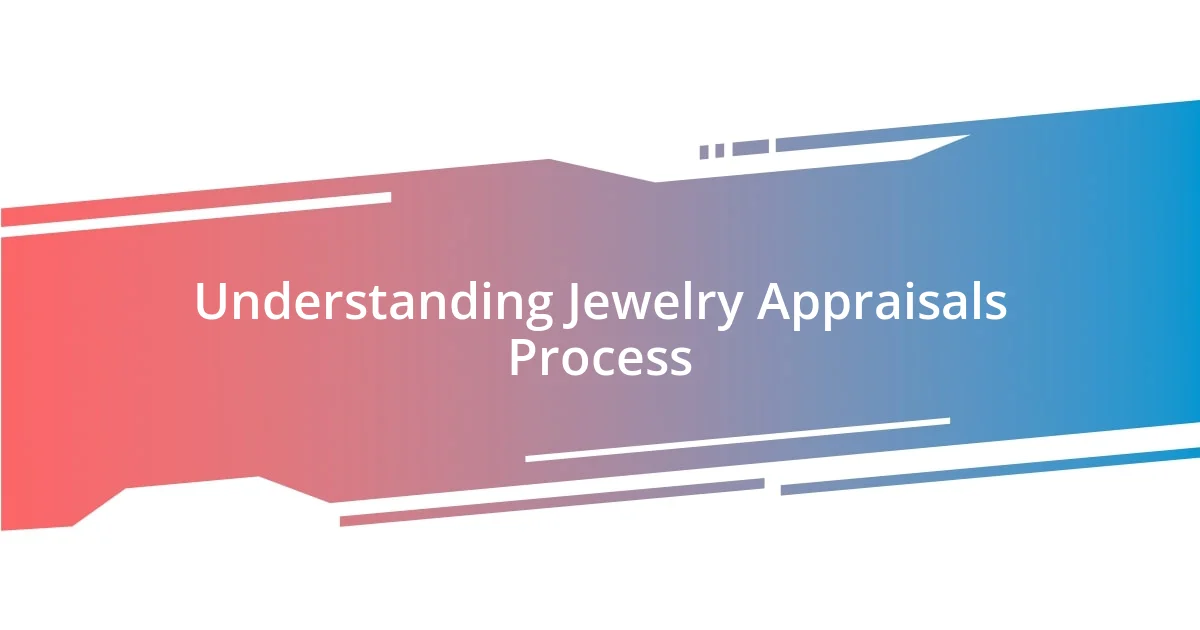
Understanding Jewelry Appraisals Process
When I first encountered the jewelry appraisal process, I was taken aback by how detailed it is. Each piece of jewelry is thoroughly examined for its unique characteristics, including materials, craftsmanship, and historical significance. It’s fascinating to think about how a simple ring can tell a story—what emotions did it evoke when gifted, or what moments did it witness?
The appraiser skillfully evaluates these elements, but it’s not just a technical undertaking; it’s almost like a conversation between them and the jewelry itself. I remember sitting with an appraiser who passionately described my grandmother’s brooch, linking its design to specific eras in fashion history. This connection made me realize—it’s not just about numbers; it’s about preserving memories.
Valuation is ultimately a blend of art and science. Each piece is assigned a monetary value, reflecting its current market trends. Have you ever wondered how trends impact the worth of things you own? I’ve seen firsthand how a vintage style can suddenly skyrocket in popularity, transforming a family heirloom into a valuable asset. Understanding this process opens a world of appreciation for the jewelry we cherish.
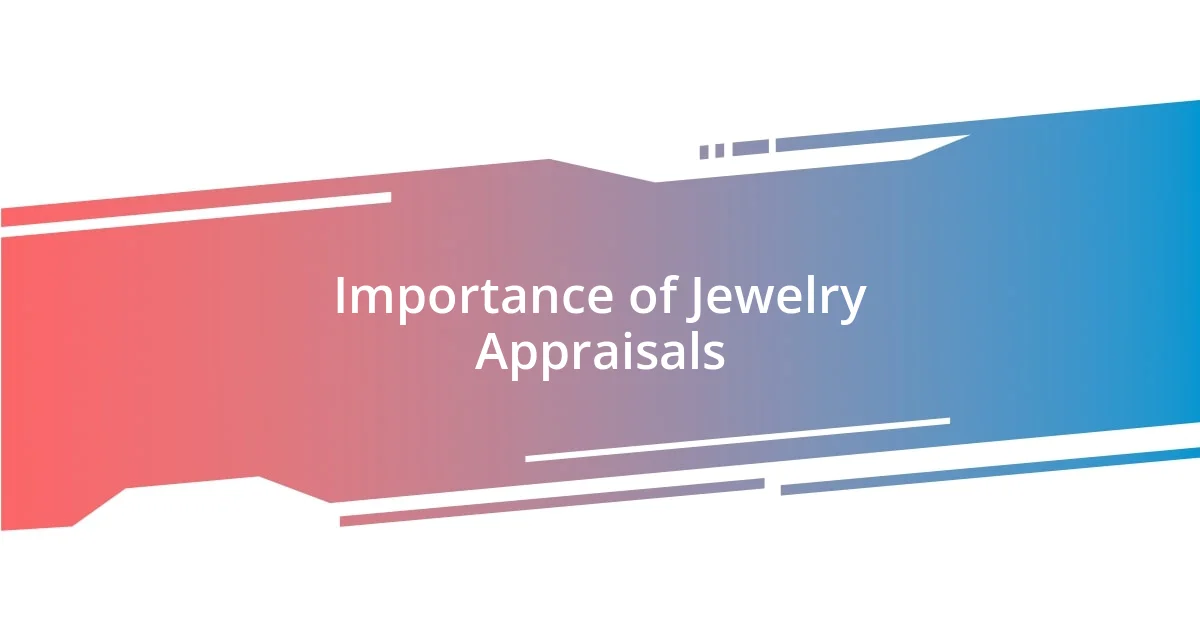
Importance of Jewelry Appraisals
Jewelry appraisals hold immense significance, serving not only to establish value but also to provide peace of mind. I remember when I obtained an appraisal for a delicate pendant that my father gifted my mother decades ago. Knowing its value reassured me that I was safeguarding a piece of our family history, adding another layer to its sentimental significance.
- Ensures accurate insurance coverage, protecting against loss or theft.
- Assists in making informed financial decisions regarding selling or trading.
- Helps identify potential investment opportunities in the ever-changing jewelry market.
- Highlights the craftsmanship and materials, deepening emotional connections.
- Aids heirs in understanding the worth of precious family pieces for future planning.
Reflecting on this experience, I realized that appraisals also serve a practical purpose; they guide our choices about what to keep, sell, or pass down. Letting go of a piece can be tough, but understanding its worth can bring clarity and make the decision easier. It’s about more than just jewelry; it’s about feeling grounded in the past while looking forward to the future.

Selecting a Qualified Appraiser
Selecting a qualified appraiser can feel like a daunting task, especially when you consider how much sentiment—and investment—lies in your jewelry. From my experience, I’ve learned that finding an appraiser with credible credentials is essential. Look for someone certified by a respected organization, such as the American Society of Appraisers or the Gemological Institute of America. Their expertise will ensure that your precious pieces are evaluated accurately.
Every appraiser has a unique approach, which can significantly affect the evaluation. I remember consulting with two different appraisers for the same piece—a ring inherited from my grandmother. The first appraiser focused solely on market value, while the second took the time to discuss its sentimental aspects, sharing stories of similar pieces that had passed through his hands. This made me realize that choosing an appraiser who understands both the financial and emotional dimensions of your jewelry can enrich the overall appraisal experience.
An important aspect to consider is the appraiser’s experience with specific types of jewelry. If you have vintage pieces, for instance, an appraiser with a robust background in estate jewelry would be ideal. I once had a charming conversation with an appraiser who specialized in antique pieces, and he not only helped me understand the value but also uncovered fascinating history that added layers to my family’s story. This made me feel like I wasn’t just getting an appraisal; I was connecting with our heritage.
| Factor | Considerations |
|---|---|
| Credentials | Seek certified appraisers from reputable organizations. |
| Approach | Choose an appraiser who values both financial and sentimental aspects. |
| Experience | Look for specialists relevant to your jewelry type for deeper insights. |
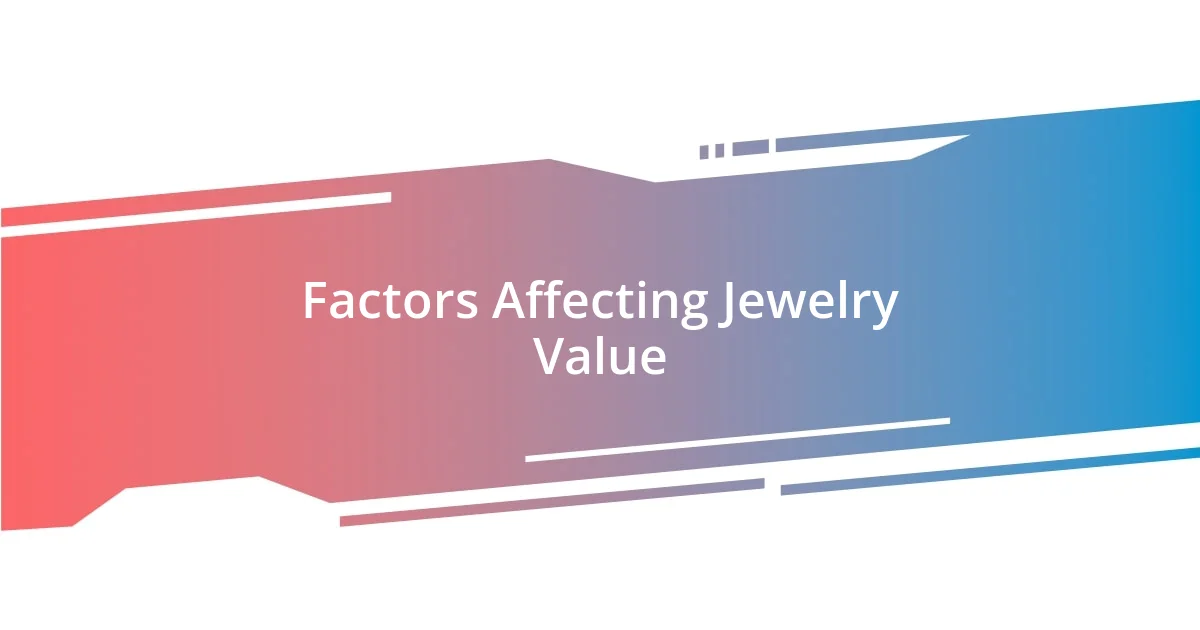
Factors Affecting Jewelry Value
Understanding what affects the value of jewelry can be quite an eye-opener. For me, the materials used play a significant role. I once had a beautiful emerald ring assessed, and the appraiser pointed out how the quality and color of the gemstone made all the difference in its worth. I never thought that something as simple as hue could elevate a piece from good to exquisite. What gemstones do you have, and how might their qualities impact their value?
Another crucial factor is craftsmanship. I remember evaluating a vintage brooch I had inherited. The intricate design and expert settings revealed that the piece wasn’t just beautiful—it was made by a renowned jeweler. Learning about those details made me appreciate it even more, but it also highlighted how an artist’s reputation can considerably increase value. It’s fascinating to consider: how much do you value the story behind the pieces in your collection?
Market trends are also something to keep in mind. When I was looking into selling an old diamond necklace, I discovered that certain styles wax and wane in popularity. For instance, the market was leaning toward minimalist designs at the time. This made me realize that even timeless pieces need to be evaluated in context. Have you ever wondered how trends might affect your jewelry’s value? It’s an ever-changing landscape, and being informed can make all the difference in making the right decisions.
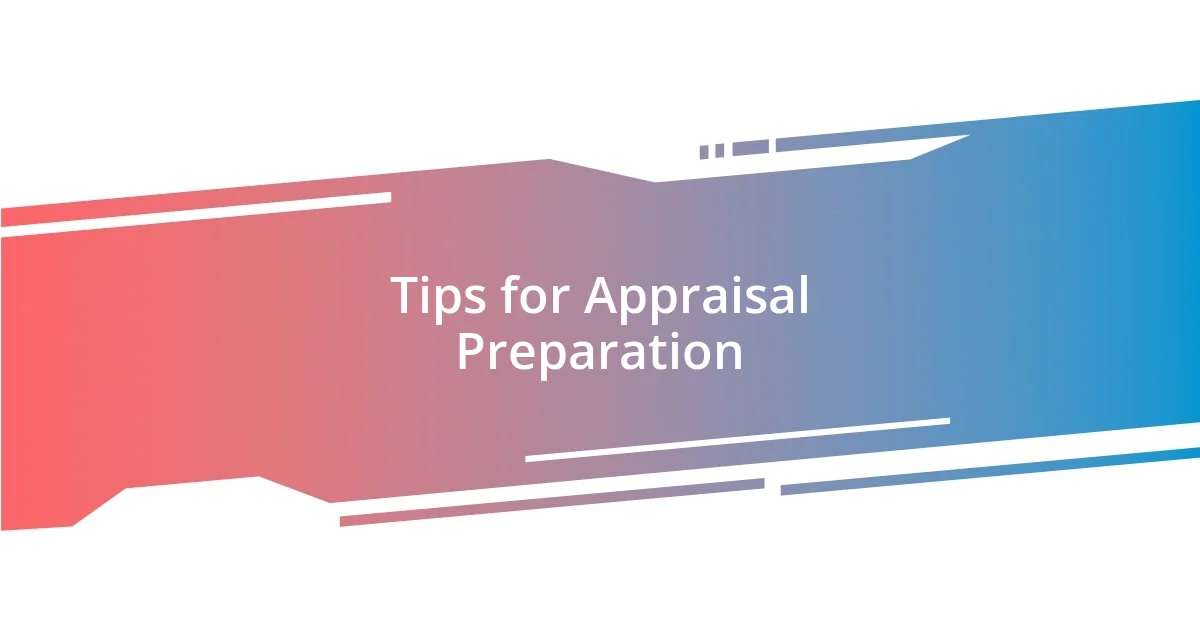
Tips for Appraisal Preparation
When preparing for a jewelry appraisal, I recommend organizing all relevant documents and receipts ahead of time. I remember frantically searching for my mother’s old appraisal papers before taking my heirloom necklace in for evaluation. Having everything in one place not only saved me stress but also helped the appraiser provide a more informed assessment.
Clean your jewelry before the appointment! A few weeks ago, I inadvertently discovered that giving my rings a gentle polish transformed their sparkle dramatically. A clean piece highlights details that might otherwise be overlooked, making the appraiser’s job easier and ensuring you present your jewelry in the best light possible. Have you ever noticed how a little shine can bring out the brilliance of a gem?
Describe your piece’s history to your appraiser, sharing anecdotes that may add context. During one appraisal, I mentioned the story behind my grandmother’s bracelet—the adventures it had shared with her. The appraiser seemed intrigued and even shared similar experiences from his own family, which made the process feel more personal. It’s fascinating how narratives can elevate the value of a piece, often turning a mere item into a cherished heirloom with a story to tell.
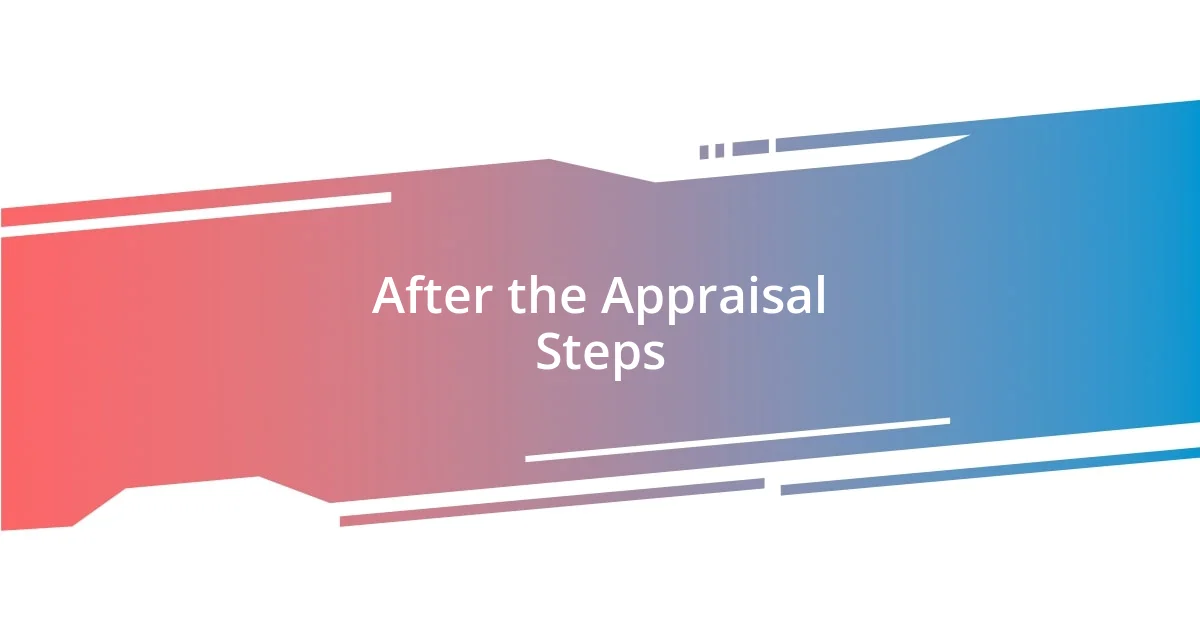
After the Appraisal Steps
Once you’ve received the appraisal, it’s vital to decide how to proceed. I remember grappling with the choice after getting a stunning appraisal for a sapphire pendant that had been a family heirloom. Do I keep it for sentimental value or consider selling it when the market is favorable? This personal dilemma made me realize that sometimes our hearts can lead us in unexpected directions, especially when emotions are tied to our treasures.
Another crucial step is ensuring that your jewelry is appropriately insured. After learning the hard way about the importance of coverage, I immediately took steps to protect my newly appraised pieces. I was surprised to find that many insurance companies require a recent appraisal to determine coverage amounts. Have you checked whether your beloved items are adequately insured? It’s a small step that can make a world of difference in peace of mind.
Finally, it’s worth considering how the appraisal impacts your relationship with your jewelry. I found that having detailed knowledge about my pieces made me appreciate them even more. I began to notice the subtleties in design and how they reflected personal stories. Have you ever felt that deeper connection after learning more about your jewelry? It’s astounding how an appraisal can transform not just the piece’s value but also your emotional attachment to it.














